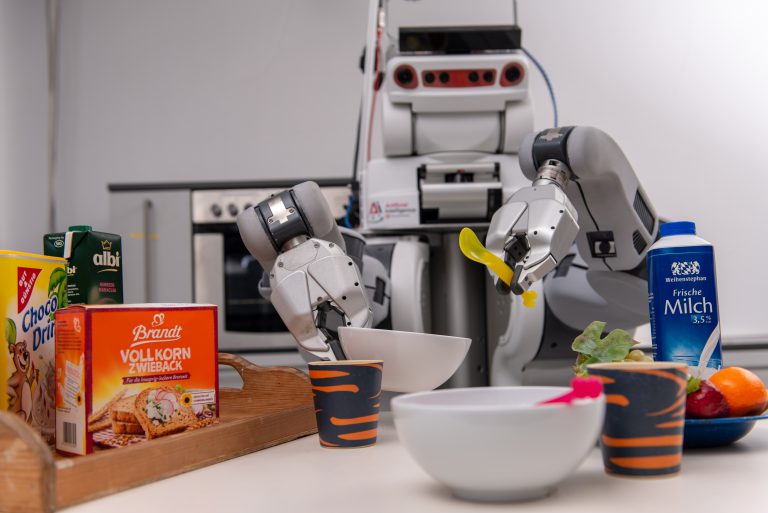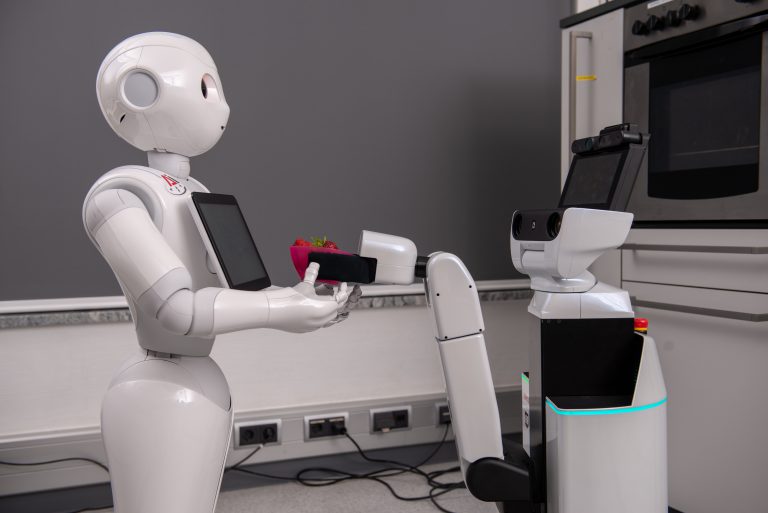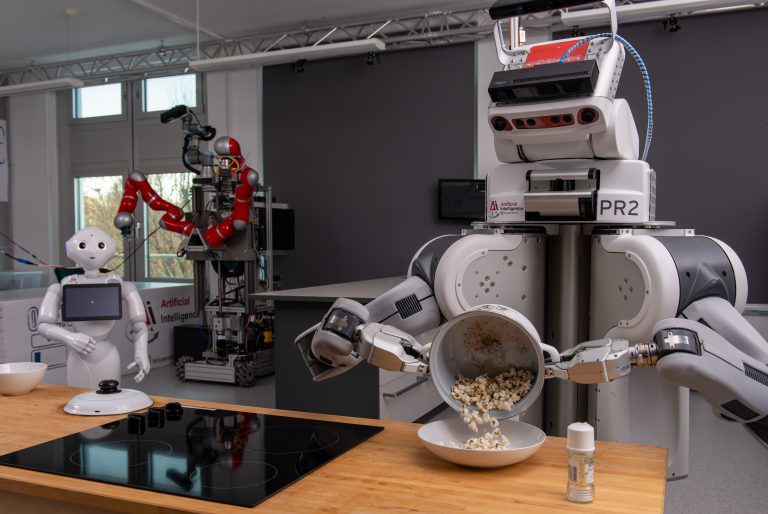Workshop on Robotic Household Interaction: Research, Implementation, and Community
The robot household challenge is one of the most important problems of service robotics, and the advances in this area are crucial for the commercialization of robotics and the wide adoption of robots in society. The aim of the workshop is to propel the discussion on the topic of tackling the household challenge and facilitate sharing of valuable research results and insights. The robot skills relevant for the household challenge are mobile pick and place, cutting, pouring, wiping, using home appliances, handling soft objects, and other actions of meal preparation and cleaning. With the goal of establishing the workshop as a yearly recurring event, we will encourage the participants to also demonstrate and share implementations, and we will provide an open-source infrastructure for doing so for those interested. The long-term goal of the workshop is to build a vibrant community around the robot household challenge.
Competitions and benchmarks regarding household robotics are proposed and conducted in different communities, including Robocup@Home and similar competitions, embodied AI in computer vision and machine learning, research networks such as the European network of excellence centers in robotics (EUROBIN), and large-scale, long-term research projects such as the EASE household challenge of the Collaborative Research Center EASE (Everyday Activity Science and Engineering).
The workshop will host presentations, poster sessions, and a panel. In the latter, we will facilitate a discussion on the criteria that autonomous household robots should exhibit and discuss the importance of different criteria such as explainability, lifetime learning, and transferability to new contexts. We would like the workshop to be a platform for hosting a competition in the area of robot household actions, where people could collaborate on and compete with complementary and alternative approaches. The competition will concentrate on one specific topic each year, such as setting a table, preparing a sandwich, sorting groceries into the shelves, etc. Additionally, we will present one approach to tackling the household challenge that our lab has been working on for more than fifteen years. We will also provide our open-source infrastructure where interested researchers can contribute their demonstrations in a virtual building setting.a
| 08:30 – 09:00 | 30 mins | Organizer Committee |
| 09:00 – 10:00 | 1 hour | Keynote 1 |
| 10:00 – 10:15 | 15 min | Coffee Break |
| 10:15 – 11:15 | 1 hour | Keynote 2 |
| 11:15 – 11:30 | 15 min | Coffee Break |
| 11:30 - 12:30 | 1 hour | Keynote 3 |
| 12:30 – 13:30 | 1 hour | Lunch |
| 13:30 – 15:00 | 1 hour 30 mins | Keynote 4 |
| 15:00 – 15:15 | 15 min | Coffee Break |
| 15:15 – 16:30 | 1 hour 30 mins | Keynote 5 |
| 16:30 – 16:45 | 15 min | Coffee Break |
| 16:45 – 18:15 | 1 hour 30 mins | Keynote 6 |
| 18:15 – 19:00 | 45 min | Discussion |
Relevance and Impact
The workshop on the Robot Household Challenge addresses a critical problem in the field of service robotics, focusing on advancing the capabilities of autonomous household robots. This topic holds significant relevance and impact for several reasons:
Technological Advancements: The challenges posed by the Robot Household Challenge drive technological advancements in perception, manipulation, and interaction, pushing the boundaries of what robots can achieve in unstructured home environments.
Community Building: The workshop aims to foster a vibrant community of researchers and practitioners focused on addressing these challenges, promoting collaboration, knowledge sharing, and the development of open-source solutions.
Explainability and Learning: Discussions on criteria like explainability, lifetime learning, and transferability of robot skills to new contexts are critical for developing safe and adaptable household robots, which have far-reaching societal implications.
Competition and Innovation: The impact of the workshop extends to various aspects of the robotics community. Competitions and benchmarks related to household robotics are actively proposed and conducted within different communities, showcasing the significance of this field. These include well-established events like Robocup@Home and similar competitions, as well as research networks such as the European network of excellence centers in robotics (EUROBIN). Furthermore, large-scale, long-term research projects like the EASE household challenge conducted by the Collaborative Research Center EASE (Everyday Activity Science and Engineering) contribute to advancing the field. These initiatives collectively highlight the growing importance of household robotics and its impact on robotics research and development.
The Robot Household Challenge workshop aims to address these aspects and serve as a platform for advancing research, fostering collaboration, and ultimately making a positive impact on society.
Organizers
- Vanessa Hassouna University of Bremen
- Prof. Dr. h.c. Michael Beetz University of Bremen
- Prof. Pedro U. Lima Instituto Superior Técnico (IST)
- Prof. David Vernon Cargenie Mellon University Africa
- Prof. Alessandro Saffiotti University of Örebro
Speaker
- Kei Okada, University of Tokyo
- Prof. Amy Loutfi, Örebro University
- Prof. Dr. h.c. Michael Beetz, University of Bremen
- Prof. Dr. Sven Behnke, University of Bonn
- Serena Ivaldi, INRIA Nancy Grand-Est and LORIA
- Prof. Ram Ramamoorthy, Institute of Perception, Action and Behaviour
- Prof. Dr. Stefan Wermter, University of Hamburg
- Prof. Jeannette Bohg, Stanford University
- Dr. Karinne Ramirez-Amaro, Chalmers University of Technology
- Prof. Chad Jenkins, University of Michigan
- Dr. Martin Guenther, German Research Center for Artificial Intelligence
- Maya Cakmak, University of Washington
Financial Support
The workshop will be supported by the Collaborative Research Center "Everyday Activity Science and Engineering (EASE)," funded by the German Research Foundation (DFG) at the University of Bremen.




